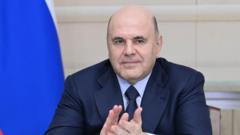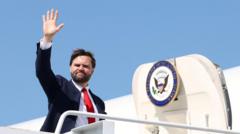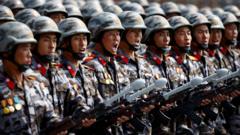North Korea's state media has hailed the commencement of construction on its first road bridge to Russia across the Tumen River as a landmark event in bilateral relations.
North Korea and Russia Commence Construction of Historic Road Bridge

North Korea and Russia Commence Construction of Historic Road Bridge
The establishment of a new road bridge signifies a pivotal moment in North Korea-Russia relations as both countries bolster cooperation amid international sanctions.
The bridge is projected to enhance connectivity between the two nations, underscoring deepening ties particularly in light of ongoing geopolitical tensions, including North Korea's recent military support for Russia in Ukraine.
The construction of the bridge, marking the first direct road link connecting North Korea and Russia, kicked off on Wednesday, according to North Korean state media KCNA. Spanning the Tumen River, the bridge will be located adjacent to the historic 'Friendship Bridge', a rail link built during the Soviet era. Completion is anticipated by mid-2026, as reported by Russia's Kommersant newspaper.
Russian Prime Minister Mikhail Mishustin, at the construction ceremony, emphasized that the bridge goes beyond engineering, stating, "It symbolizes our common desire to strengthen friendly, good-neighbourly relations and increase inter-regional cooperation." This development comes shortly after North Korea acknowledged sending troops to aid Russia in its ongoing war against Ukraine, indicating a notable shift in military alliances amid escalating tensions since Russia's invasion of Ukraine in 2022.
The bridge's construction follows discussions during Russian President Vladimir Putin's visit to Pyongyang last year, where the two leaders agreed to a "comprehensive strategic partnership," marking an elevation of ties between the countries.
Amid these developments, South Korean lawmakers reported more than 600 North Korean soldiers may have lost their lives supporting Russian efforts in Ukraine, highlighting the profound military collaboration between the two nations. Reports have also emerged suggesting that in return for military assistance, Russia has been supplying North Korea with various technological support, including spy satellites and drones.
This new infrastructure project reflects both nations' ongoing commitment to their partnership as they navigate the complexities of international relations.
The construction of the bridge, marking the first direct road link connecting North Korea and Russia, kicked off on Wednesday, according to North Korean state media KCNA. Spanning the Tumen River, the bridge will be located adjacent to the historic 'Friendship Bridge', a rail link built during the Soviet era. Completion is anticipated by mid-2026, as reported by Russia's Kommersant newspaper.
Russian Prime Minister Mikhail Mishustin, at the construction ceremony, emphasized that the bridge goes beyond engineering, stating, "It symbolizes our common desire to strengthen friendly, good-neighbourly relations and increase inter-regional cooperation." This development comes shortly after North Korea acknowledged sending troops to aid Russia in its ongoing war against Ukraine, indicating a notable shift in military alliances amid escalating tensions since Russia's invasion of Ukraine in 2022.
The bridge's construction follows discussions during Russian President Vladimir Putin's visit to Pyongyang last year, where the two leaders agreed to a "comprehensive strategic partnership," marking an elevation of ties between the countries.
Amid these developments, South Korean lawmakers reported more than 600 North Korean soldiers may have lost their lives supporting Russian efforts in Ukraine, highlighting the profound military collaboration between the two nations. Reports have also emerged suggesting that in return for military assistance, Russia has been supplying North Korea with various technological support, including spy satellites and drones.
This new infrastructure project reflects both nations' ongoing commitment to their partnership as they navigate the complexities of international relations.



















